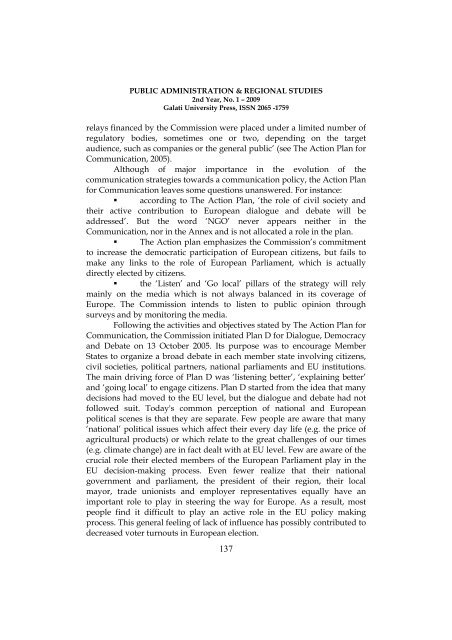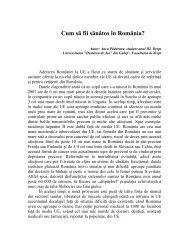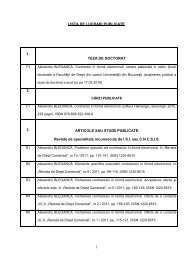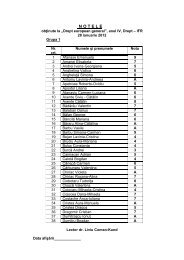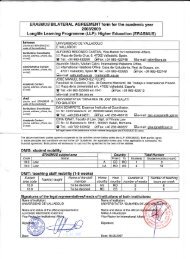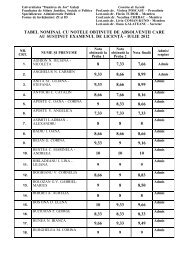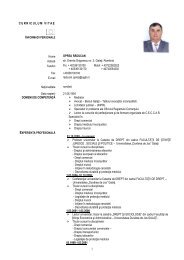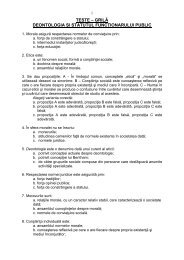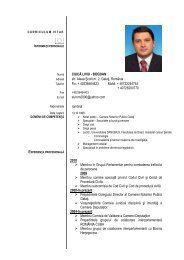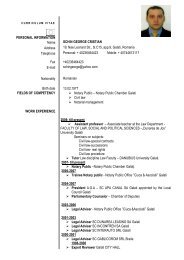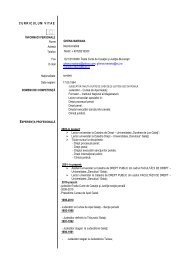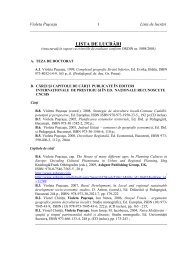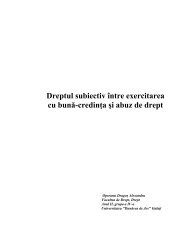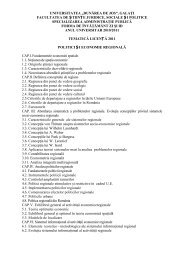regional studies public administration - Facultatea de Drept ...
regional studies public administration - Facultatea de Drept ...
regional studies public administration - Facultatea de Drept ...
You also want an ePaper? Increase the reach of your titles
YUMPU automatically turns print PDFs into web optimized ePapers that Google loves.
PUBLIC ADMINISTRATION & REGIONAL STUDIES<br />
2nd Year, No. 1 – 2009<br />
Galati University Press, ISSN 2065 -1759<br />
relays financed by the Commission were placed un<strong>de</strong>r a limited number of<br />
regulatory bodies, sometimes one or two, <strong>de</strong>pending on the target<br />
audience, such as companies or the general <strong>public</strong>’ (see The Action Plan for<br />
Communication, 2005).<br />
Although of major importance in the evolution of the<br />
communication strategies towards a communication policy, the Action Plan<br />
for Communication leaves some questions unanswered. For instance:<br />
• according to The Action Plan, ‘the role of civil society and<br />
their active contribution to European dialogue and <strong>de</strong>bate will be<br />
addressed’. But the word ‘NGO’ never appears neither in the<br />
Communication, nor in the Annex and is not allocated a role in the plan.<br />
• The Action plan emphasizes the Commission’s commitment<br />
to increase the <strong>de</strong>mocratic participation of European citizens, but fails to<br />
make any links to the role of European Parliament, which is actually<br />
directly elected by citizens.<br />
• the ‘Listen’ and ‘Go local’ pillars of the strategy will rely<br />
mainly on the media which is not always balanced in its coverage of<br />
Europe. The Commission intends to listen to <strong>public</strong> opinion through<br />
surveys and by monitoring the media.<br />
Following the activities and objectives stated by The Action Plan for<br />
Communication, the Commission initiated Plan D for Dialogue, Democracy<br />
and Debate on 13 October 2005. Its purpose was to encourage Member<br />
States to organize a broad <strong>de</strong>bate in each member state involving citizens,<br />
civil societies, political partners, national parliaments and EU institutions.<br />
The main driving force of Plan D was ‘listening better’, ‘explaining better’<br />
and ‘going local’ to engage citizens. Plan D started from the i<strong>de</strong>a that many<br />
<strong>de</strong>cisions had moved to the EU level, but the dialogue and <strong>de</strong>bate had not<br />
followed suit. Today's common perception of national and European<br />
political scenes is that they are separate. Few people are aware that many<br />
‘national’ political issues which affect their every day life (e.g. the price of<br />
agricultural products) or which relate to the great challenges of our times<br />
(e.g. climate change) are in fact <strong>de</strong>alt with at EU level. Few are aware of the<br />
crucial role their elected members of the European Parliament play in the<br />
EU <strong>de</strong>cision-making process. Even fewer realize that their national<br />
government and parliament, the presi<strong>de</strong>nt of their region, their local<br />
mayor, tra<strong>de</strong> unionists and employer representatives equally have an<br />
important role to play in steering the way for Europe. As a result, most<br />
people find it difficult to play an active role in the EU policy making<br />
process. This general feeling of lack of influence has possibly contributed to<br />
<strong>de</strong>creased voter turnouts in European election.<br />
137


